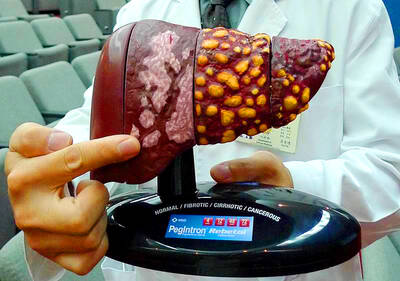A university lecturer was yesterday sentenced to life in prison by the Taiwan High Court’s Kaohsiung branch in an arson case in which four people were killed.
However, the ruling — and the long case that preceded it — was not without controversy, as the accused, Chen Pei-yuan (陳培元), and his attorney maintained that he suffers from serious mental illness and was insane at the time of his crime.
Chen’s attorney has accused the judiciary of discriminating against the mentally ill.
In the ruling yesterday, the court said Chen’s act was deserving of the death penalty, but because he had diminished capacity at the time he was unable grasp the severity of his crime, and so the sentence was reduced to life imprisonment.
The ruling also said that Chen set the fire only after the victims refused to lend him money.
The ruling can be appealed to the Supreme Court.
In the early hours of June 5, 2007, a petrol bomb was thrown into Hua Xin Cleaners in Kaohsiung City’s Zuoying District (左營).
Chen, who lived next door, was arrested a week later and charged with murder.
According to the Criminal Code, a person found to be insane cannot be convicted of a crime. However, if a judge determines that a suspect had “diminished capacity” to understand his or her actions, the code allows — but does not mandate — a lighter sentence.
Chen has been receiving medical treatment since his arrest.
Prosecutors in charge of the case sought the death penalty, arguing that Chen should pay the ultimate price to take responsibility for the four people who died at his hand.

The Taipei Summer Festival is to begin tomorrow at Dadaocheng Wharf (大稻埕), featuring four themed firework shows and five live music performances throughout the month, the Taipei Department of Information and Tourism said today. The festival in the city’s Datong District (大同) is to run until Aug. 30, holding firework displays on Wednesdays and the final Saturday of the event. The first show is scheduled for tomorrow, followed by Aug. 13, 20 and 30. To celebrate the 30th anniversary of Disney Pixar's movie Toy Story, the festival has partnered with Walt Disney Co (Taiwan) to host a special themed area on

Aftershocks from a magnitude 6.2 earthquake that struck off Yilan County at 3:45pm yesterday could reach a magnitude of 5 to 5.5, the Central Weather Administration (CWA) said. Seismological Center technical officer Chiu Chun-ta (邱俊達) told a news conference that the epicenter of the temblor was more than 100km from Taiwan. Although predicted to measure between magnitude 5 and 5.5, the aftershocks would reach an intensity of 1 on Taiwan’s 7-tier scale, which gauges the actual effect of an earthquake, he said. The earthquake lasted longer in Taipei because the city is in a basin, he said. The quake’s epicenter was about 128.9km east-southeast

BE CAREFUL: The virus rarely causes severe illness or death, but newborns, older people and those with medical conditions are at risk of more severe illness As more than 7,000 cases of chikungunya fever have been reported in China’s Guangdong Province this year, including 2,892 new cases last week, the Centers for Disease Control (CDC) yesterday said it is monitoring the situation and considering raising the travel notice level, which might be announced today. The CDC issued a level 1 travel notice, or “watch,” for Guangdong Province on July 22, citing an outbreak in Foshan, a manufacturing hub in the south of the province, that was reported early last month. Between July 27 and Saturday, the province reported 2,892 new cases of chikungunya, reaching a total of 7,716

STAY VIGILANT: People should reduce the risk of chronic liver inflammation by avoiding excessive alcohol consumption, smoking and eating pickled foods, the physician said A doctor last week urged people to look for five key warning signs of acute liver failure after popular producer-turned-entertainer Shen Yu-lin (沈玉琳) was reportedly admitted to an intensive care unit for fulminant hepatitis. Fulminant hepatitis is the rapid and massive death of liver cells, impairing the organ’s detoxification, metabolic, protein synthesis and bile production functions, which if left untreated has a mortality rate as high as 80 percent, according to the Web site of Advancing Clinical Treatment of Liver Disease, an international organization focused on liver disease prevention and treatment. People with hepatitis B or C are at higher risk of